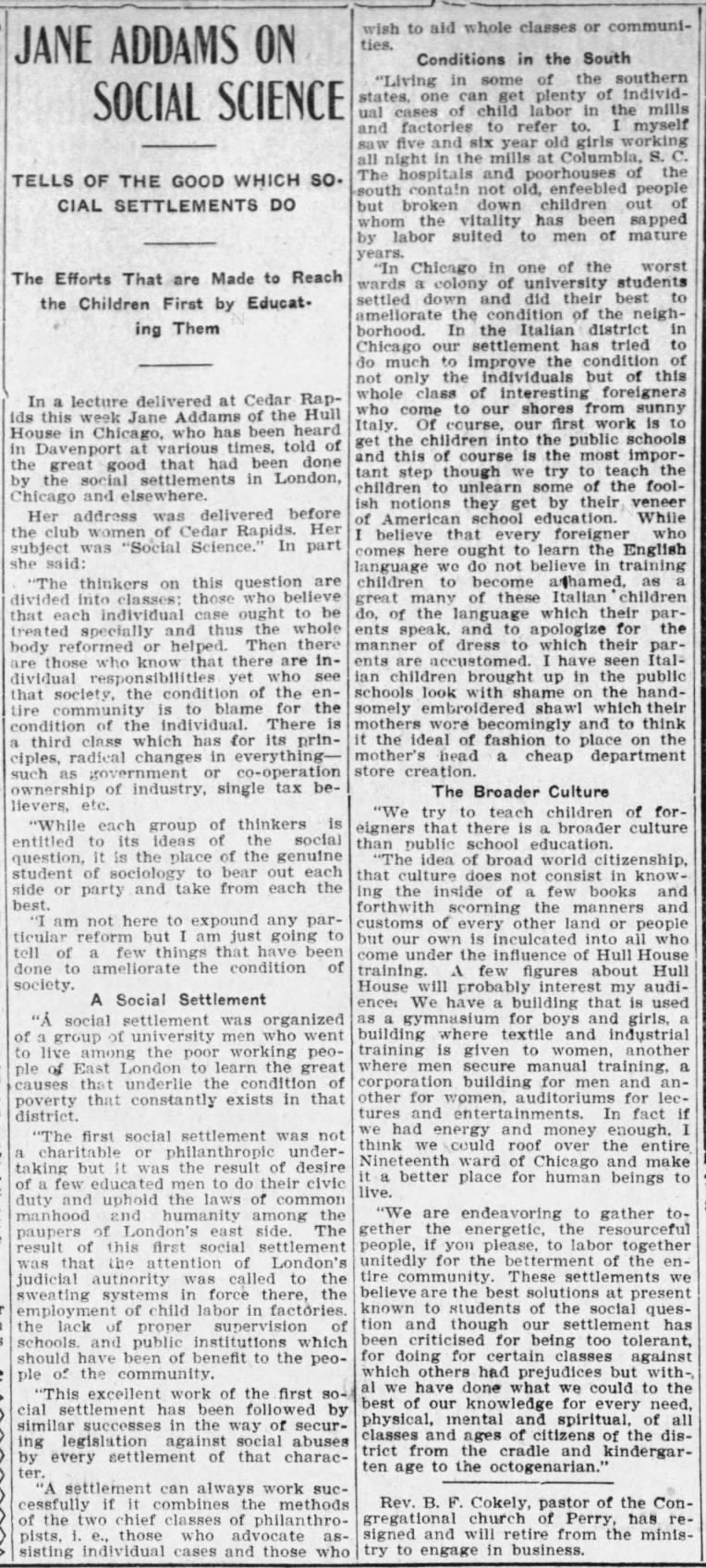In a lecture delivered at Cedar Rapids this week Jane Addams of the Hull House in Chicago, who has been heard in Davenport at various times, told of the great good that had been done by the social settlements in London, Chicago and elsewhere.
Her address was delivered before the club women of Cedar Rapids. Her subject was "Social Science." In part she said:
"The thinkers on this question are divided into classes; those who believe that each individual case ought to be treated specially and thus the whole body reformed or helped. Then there are those who know that there are individual responsibilities yet who see that society, the condition of the entire community is to blame for the condition of the individual. There is a third class which has for its principles, radical changes in everything -- such as government or [cooperation] ownership of industry, single tax believers, etc.
"While each group of thinkers is entitled to its ideas of the social question, it is the place of the genuine student of sociology to bear out each side or party and take from each the best.
"I am not here to expound any particular reform but I am just going to tell of a few things that have been done to ameliorate the condition of society."
"A social settlement was organized of a group of university men who went to live among the poor working people of East London to learn the great causes that underlie the condition of poverty that constantly exists in that district.
"The first social settlement was not a charitable or philanthropic undertaking but it was the result of desire of a few educated men to do their civic duty and uphold the laws of common manhood and humanity among the paupers of London's east side. The result of this first social settlement was that the attention of London's judicial authority was called to the sweating systems in force there, the employment of child labor in factories, the lack of proper supervision of schools, and public institutions which should have been of benefit to the people of the community.
"This excellent work of the first social settlement has been followed by similar successes in the way of securing legislation against social abuses by every settlement of that character.
"A settlement can always work successfully if it combines the methods of the two chief classes of philanthropists, i.e., those who advocate assisting individual cases and those who wish to aid whole classes or communities."
"Living in some of the southern states, one can get plenty of individual cases of child labor in the mills and factories to refer to. I myself saw five and six year old girls working all night in the mills at Columbia, S.C. The hospitals and poorhouses of the south contain not old, enfeebled people but broken down children out of whom the vitality has been sapped by labor suited to men of mature years.
"In Chicago in one of the worst wards a colony of university students settled down and did their best to ameliorate the condition of the neighborhood. In the Italian district in Chicago our settlement has tried to do much to improve the condition of not only the individuals but of this whole class of interesting foreigners who come to our shores from sunny Italy. Of course, our first work is to get the children into the public schools and this of course is the most important step though we try to teach the children to unlearn some of the foolish notions they get by their veneer of American school education. While I believe that every foreigner who comes here ought to learn the English language we do not believe in training children to become ashamed, as a great many of these Italian children do, of the language which their parents speak, and to apologize for the manner of dress to which their parents are accustomed. I have seen Italian children brought up in the public schools look with shame on the handsomely embroidered shawl which their mothers wore becomingly and to think it the ideal of fashion to place on the mother's head a cheap department store creation."
"We try to teach children of foreigners that there is a broader culture than public school education.
"The idea of broad world citizenship, that culture does not consist in knowing the inside of a few books and forthwith scorning the manners and customs of every other land or people but our own is inculcated into all who come under the influence of Hull House training. A few figures about Hull House will probably interest my audience. We have a building that is used as a gymnasium for boys and girls, a building where textile and industrial training is given to women, another where men secure manual training, a corporation building for men and another for women, auditoriums for lectures and entertainments. In fact if we had energy and money enough, I think we could roof over the entire Nineteenth Ward of Chicago and make it a better place for human beings to live.
"We are endeavoring to gather together the energetic, the resourceful people, if you please, to labor together unitedly for the betterment of the entire community. These settlements we believe are the best solutions at present known to students of the social question and though our settlement has been [criticized] for being too tolerant, for doing for certain classes against which others had prejudices but withal we have done what we could to the best of our knowledge for every need, physical, mental and spiritual, of all classes and ages of citizens of the district from the cradle and kindergarten age to the octogenarian."







Comments